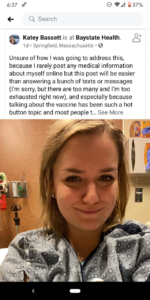What we DON’T support is the apparent suppression of reports of severe adverse reactions to those treatments.
We are copy/pasting Ms. Bassett’s account of her own reaction below, and we wish her a complete and speedy recovery.
Shouldn’t Massachusetts residents be told that one of their residents had a severe anaphylactic reaction to their vaccine?
OUR QUESTIONS:
- Shouldn’t everyone in the country be told exactly how many people ARE having serious reactions, what kind of reactions, whether or not they have resolved, what state they’re in, AND WHAT LOT NUMBER THEY RECEIVED?
- Are COVID-19 vaccine lots “split up,” with only vaccines from multiple lots going to each individual location to hide evidence of a “hot lot?” We know that this has been industry policy in the US since 1979.
- Did you know that?
- WHO IS KEEPING TRACK OF WHAT LOT NUMBERS GO WHERE, AND HOW MANY SERIOUS ADVERSE REACTIONS OCCUR WITH EACH LOT?
- How many is TOO many?
“Unsure of how I was going to address this, because I rarely post any medical information about myself online but this post will be easier than answering a bunch of texts or messages (I’m sorry, but there are too many and I’m too exhausted right now), and especially because talking about the vaccine has been such a hot button topic and most people think I’m an anti-vaxxer because I brought up legitimate questions and concerns people should be considering before taking either of the COVID vaccines approved for emergency use currently.
And with that being said, anyone who actually knows me can now say they know someone who had a severe allergic reaction to the vaccine. And I think it’s important people understand the questions and concerns people have are real and not just fueled by political agenda, also that the reaction I had was not extremely common even for the “severe” reactions listed as possibilities. I work for Baystate Franklin and was eligible for the vaccine with the first round of employees because of my level of risk to exposure in my position.
My reaction started 5-10 minutes after receiving the injection and I was brought from the vaccination clinic on Whitney Ave to the BMC ER in Springfield for an anaphylactic reaction, I had a rash, difficulty breathing, increased heart rate, sweating, cold extremities, itchiness and chills. I received Benadryl on the ambulance ride and epinephrine and prednisone at the ER and they were basically keeping me to monitor my reaction to the epi because my heart rate wouldn’t budge and was very high.
Three hours after arriving at the ER and getting the first round of meds the doctor decided to do an ultrasound of my heart because both EKGs looked good but my heart rate was resting in the 140/150 range still at the same time my cardiac monitor started alarming another attending had noticed a new rash had started to form on my neck and chests area and I was experiencing difficulty breathing again.
I was immediately moved to a room and administered another round of medication and more fluids because I was having a second anaphylactic episode. They decided to admit me for observation at this point because they were worried I was going to have another reaction and need an epi-drip and needed to monitor my heart rate. Luckily my ultrasound looked good and so did another EKG and slowly but surely my heart rate came down over the next day. It’s still higher than normal but they felt comfortable sending me home this afternoon around 330.
I need to monitor myself for the next couple days because some people have reactions up to 72 hours after a severe reaction. This is not common and it’s not something I will hopefully have to worry about. I’m going to be on steroids for the next few days and I get to carry around a shiny new epipen with me.
My hospital staff at Baystate Medical Center were really great and they took really good care of me during one of the scariest things I’ve ever experienced, I couldn’t have asked for a more compassionate team of healthcare workers.
I’ve never had such a severe allergic reaction to anything before and I do not have a lot of allergies. I’m allergic to mold, penicillin, amoxicillin and some component in most of the blue and yellow surgical masks that have been manufactured since the pandemic started, and the masks are the only thing on that list I’ve ever had a severe reaction to.
I think the most bizarre parts of the whole situation, first was that my vaccination site did not have any of the following around in case someone had an allergic reaction like mine: blood pressure cuffs, epipens, antihistamines, a stethoscope or a timing device to track my pulse all of which are safeguards that should be in place according to the CDCs website in case something like this does happen and I have no idea if my facility reported my reaction, I’ve only heard of one other person in Alaska who has been sent to the ER for anything close to like what happened with me.
Second was that as I sat in my hospital bed this afternoon I still felt an incredible sense of guilt calling in sick for my next shift.”

